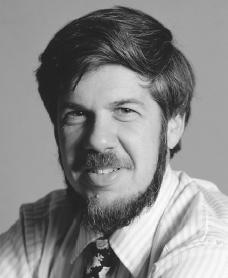
Stephen Jay Gould was an American paleontologist, evolutionary biologist, and historian of science. He was one of the most influential and widely read authors of popular science of his generation. Gould spent most of his career teaching at Harvard University and working at the American Museum of Natural History in New York. In 1996, Gould was hired as the Vincent Astor Visiting Research Professor of Biology at New York University, after which he divided his time teaching between there and Harvard.
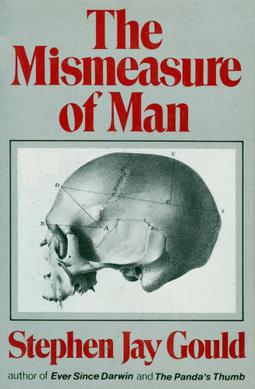
The Mismeasure of Man is a 1981 book by paleontologist Stephen Jay Gould. The book is both a history and critique of the statistical methods and cultural motivations underlying biological determinism, the belief that "the social and economic differences between human groups—primarily races, classes, and sexes—arise from inherited, inborn distinctions and that society, in this sense, is an accurate reflection of biology".
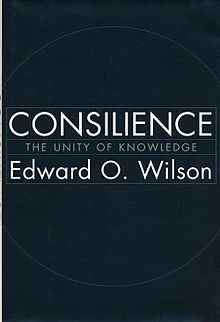
Consilience: The Unity of Knowledge is a 1998 book by the biologist E. O. Wilson, in which the author discusses methods that have been used to unite the sciences and might in the future unite them with the humanities.

Wonderful Life: The Burgess Shale and the Nature of History is a 1989 book on the evolution of Cambrian fauna by Harvard paleontologist Stephen Jay Gould. The volume made The New York Times Best Seller list, was the 1991 winner of the Royal Society's Rhone-Poulenc Prize, the American Historical Association's Forkosch Award, and was a 1991 finalist for the Pulitzer Prize. Pulitzer juror Joyce Carol Oates later revealed the non-fiction jury had unanimously recommended the book for the prize, but the selection was rejected by the Pulitzer board. Gould described his later book Full House (1996) as a companion volume to Wonderful Life.
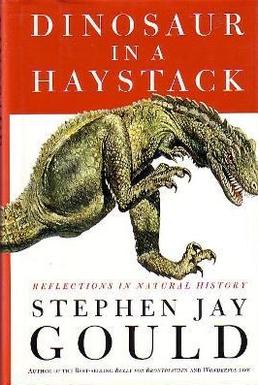
Dinosaur in a Haystack is a 1995 book by the paleontologist Stephen Jay Gould. It collects essays culled from Gould's monthly column "The View of Life" published in Natural History magazine, which Gould contributed for 27 years. The book deals with themes familiar to Gould's writing: evolution, science biography, probabilities, and strange oddities found in nature.
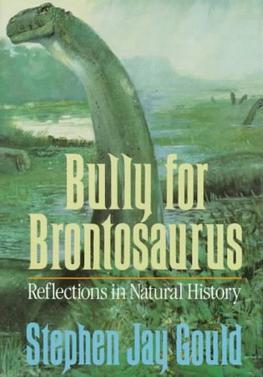
Bully for Brontosaurus (1991) is the fifth volume of collected essays by the Harvard paleontologist Stephen Jay Gould. The essays were culled from his monthly column "This View of Life" in Natural History magazine, to which Gould contributed for 27 years. The book deals, in typically discursive fashion, with themes familiar to Gould's writing: evolution and its teaching, science biography, and probabilities.
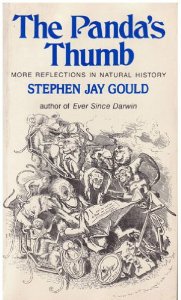
The Panda's Thumb: More Reflections in Natural History (1980) is a collection of 31 essays by the Harvard University paleontologist Stephen Jay Gould. It is the second volume culled from his 27-year monthly column "This View of Life" in Natural History magazine. Recurring themes of the essays are evolution and its teaching, science biography, probabilities and common sense.
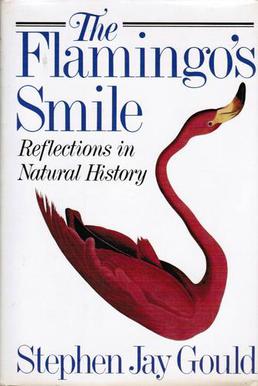
The Flamingo's Smile: Reflections in Natural History, published in 1985, is the fourth volume of collected essays from evolutionary biologist and well-known science writer Stephen Jay Gould.
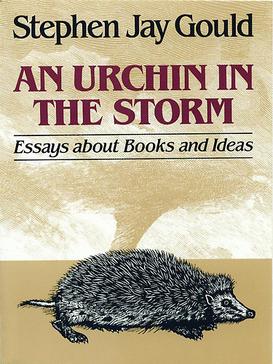
An Urchin in the Storm is a 1987 essay collection from paleontologist and science writer Stephen Jay Gould.

Eight Little Piggies (1993) is the sixth volume of collected essays by the Harvard paleontologist Stephen Jay Gould. The essays were selected from his monthly column "The View of Life" in Natural History magazine, to which Gould contributed for 27 years. The book covers topics that are common to Gould's writing in a discursive manner, including evolution and its teaching, science biography, probabilities, and common sense.
Tom Bethell was an American journalist who wrote mainly on economic and scientific issues.
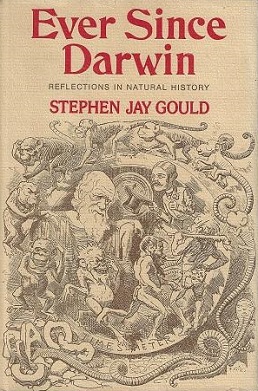
Ever Since Darwin is a 1977 book by the paleontologist Stephen Jay Gould. Gould's first book of collected essays, it originated from his monthly column "This View of Life," published in Natural History magazine. Edwin Barber—who was then the editorial director for W. W. Norton & Company— encouraged Gould to produce a book. He soon commissioned Gould to write The Mismeasure of Man, but it was not until three years later, when Gould accumulated 33 columns, that it occurred to either of them that the Natural History columns should be published in a single volume. The collection of essays, written between 1973–1977, became a best-seller and propelled Gould to national prominence.

Hen's Teeth and Horse's Toes (1983) is Stephen Jay Gould's third volume of collected essays reprinted from his monthly columns for Natural History magazine titled "This View of Life".

I Have Landed (2002) is the 10th and final volume of collected essays by the Harvard paleontologist Stephen Jay Gould. The essays were culled from his monthly column "This View of Life" in Natural History magazine, to which Gould contributed for 27 years. The book deals, in typically discursive fashion, with themes familiar to Gould's writing: evolution and its teaching, science biography, probabilities and common sense.

The Lying Stones of Marrakech (2000) is the ninth volume of collected essays by the Harvard paleontologist, Stephen Jay Gould.

Rocks of Ages: Science and Religion in the Fullness of Life is a 1999 book about the relationship between science and religion by the Harvard paleontologist Stephen Jay Gould. First published by Ballantine Books, it was reprinted by Vintage Books. The book is a volume in the series, The Library of Contemporary Thought.
Elisabeth Anne Lloyd is an American philosopher of science specialising in the philosophy of biology. She is currently Distinguished Professor of History and Philosophy of Science and Medicine - as well as Adjunct Professor of biology - at Indiana University, Bloomington, affiliated faculty scholar at the Kinsey Institute and Adjunct Faculty at the Center for the Integrative Study of Animal Behavior.
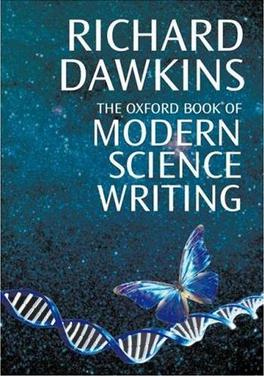
The Oxford Book of Modern Science Writing is an anthology of scientific writings, arranged and introduced by Richard Dawkins of the University of Oxford. Published first in March 2008, it contains 83 writings on many topics from a diverse variety of authors, which range in length from one to eight pages. All inclusions are dated post-1900, and include poetry, anecdotes, and general philosophical musings.
Non-overlapping magisteria (NOMA) is the view, advocated by paleontologist Stephen Jay Gould, that science and religion each represent different areas of inquiry, fact vs. values, so there is a difference between the "nets" over which they have "a legitimate magisterium, or domain of teaching authority", and the two domains do not overlap. He suggests, with examples, that "NOMA enjoys strong and fully explicit support, even from the primary cultural stereotypes of hard-line traditionalism" and that it is "a sound position of general consensus, established by long struggle among people of goodwill in both magisteria." Some have criticized the idea or suggested limitations to it, and there continues to be disagreement over where the boundaries between the two magisteria should be.

Vladimir Onufrievich Kovalevsky was a Russian academic and paleontologist. One of the first adopters of Charles Darwin in Russia, he is most notable for his early work on the evolution of the Hippomorpha family. Brother of Alexander Kovalevsky. He married Sofia Kovalevskaya, and had a daughter named Sofia, nicknamed 'Fufa'. After spending some years together as a couple, Vladimir, financially ruined, a victim of depression and unable to support his wife and daughter, committed suicide.
















